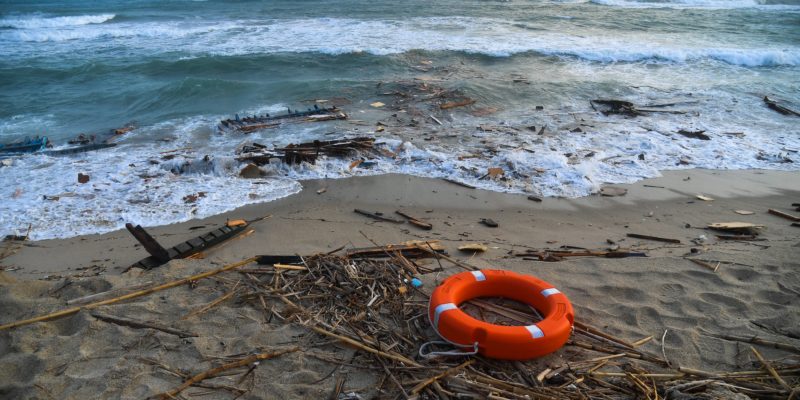There are quite a few reasons to recognize the Italian government’s decisions on immigration as politically, socially, morally, and legally serious. Distorted by disturbingly sentimental paternalism and an apparent compassion for children and the dead, the government’s decisions constitute a return to pre-modernity.
Firstly, the stereotype of the foreigner being a threat must be deconstructed. As far back as 1764, Beccaria, with his utilitarian pragmatism within a universalist perspective, broke through prejudices against foreigners. For the great philosopher hailing from Milan, it was necessary to mistrust those in our country who are well-resourced and yet do nothing, rather than picking on foreigners. On the contrary, the latter deserved to be treated with greater grace in the case of mistakes and even crimes, due to their ignorance of the language. Thus, to reiterate – the government’s choices on immigration can be seen as a response loyal to a sovereignist political philosophy that takes us back in time.
Sovereignism, as we have been taught by Immanuel Kant, Hans Kelsen, Sigmund Freud, Albert Einstein, Altiero Spinelli, Boutros Ghali, Luigi Ferrajoli, and Pope Francis, is belligerence in action. Sovereignism must be countered with a cosmopolitanism that has its foundation in multilateralism and the principles of equality and human dignity. Thus the premise for any criticism of the most recent governmental decisions on immigration remains one that has to do with the foundations of democracy, the rule of law, international relations, and the interdependence and indivisibility of human rights.
To look at movements of human beings as a risk “to democracy in our country” (Minniti, Minister of the Interior, 2017) is to pander to the fear-mongering rhetoric which is the founding premise of nationalist sovereignty. That same nationalist sovereignty that does not favor dialogue between peoples and is light years away from fraternity as a precondition for human, social and political relations at all levels. Brothers not as Cain and Abel, but as people who value the diversity amongst them, including diversity of language, nationality, traditions, and religion.
This type of fraternity does not question the rule of law but limits its arbitrary powers in the name of peace and human rights. Sovereignism feeds on populism, which in turn is a strategy of action that disregards the rationality of statistical data and data analysis, relying instead on the emotional instrumentalisation of people’s ancestral fears. Essentially it is the drift of the rule of law into a demo-consensual state.
The government’s declaration of a state of emergency to manage migrant arrivals by sea is evidence of this political subculture. Firstly, it disregards the diachronic migrant arrival data. Arrivals by sea in the first three-and-a-half months of 2023 amounted to some 42,000 people. Assuming this projection of landings is maintained until the end of the year, this would match the number of migrant arrivals in 2022 (as certified by UNHCR, i.e. just over 152,000 people). Arrivals in 2022 and 2023 would still be less than the number of people who arrived in Italy from 2014-2016. A structural phenomenon cannot be treated as if it were an emergency. An emergency should be declared in the presence of unforeseeable, exceptional circumstances; usually natural disasters or events caused by natural factors. The rule referred to by the government, used to declare a state of emergency and free itself from the limits of ordinary legislation, was designed to deal with situations such as earthquakes and environmental catastrophes, for civil protection.
Three years ago, right-wing sovereignists (those who today have asked for and been granted the commission of an enquiry into how the pandemic was dealt with) and devotees of the rule of law, opposed, even with differing rationale ex-Prime Minister Giuseppe Conte’s Prime Ministerial Decree placing limits on people’s freedom of movement to deal with the COVID-19 pandemic.
Many of the supporters of today’s declared state of emergency on immigration were the same people who contested the use of a state of emergency when it came to the deadly pandemic, in the name of unconditional ‘individual freedom’, however disrespectful of the freedoms of others (it is enough to go back to the literature of the last two centuries, from John Stuart Mill to Amartya Sen, to understand how the notion of freedom is not absolute but necessarily relational).
The unsaid underpinning of such a position is “the foreigner”, if they are poor and not European in appearance, constitutes a risk to the security of our country – and even more than a virus that has killed almost seven million people worldwide. What a bizarre indictment of the protection priorities of Italian citizens.
So what will the declaration of a state of emergency do? Probably facilitate the construction of new administrative detention centers for migrants (CPRs). Here too, both legal and political-cultural arguments should lead us to look with great distrust at places where rights are systematically violated, where people’s health is compromised, and where freedom is denied even though no criminal offense has been committed. In this case, you would expect the low numbers of repatriations after imprisonment in the CPRs (less than 50% were repatriated in 2021, according to data from the National Guarantor for Persons Deprived of their Liberty) to discourage this costly and useless policy for dealing with migrant arrivals.
But sovereignist populism needs symbols, and administrative prisons for immigrants are an extraordinary (but mystifying) symbol of repression, force, and severity. And so the idea passes that those people, to have been placed in a quasi-prison, must have done something wrong or are expected to. Thus administrative law is transformed into criminal brutality without the due process and other safeguards that criminal law itself provides for those who have committed a crime. Fortunately, some regions and just as many mayors have decided not to endorse such a policy. They must be given credit for this.
I remember a precedent on the state of emergency in a different but similar issue (in terms of the demagogic manner in which it is approached) – that declared in respect of prison overcrowding. In 2011, the Berlusconi government declared a state of emergency due to the high numbers of prisoners in the country (ignoring that with changes to the laws on drugs and immigration, these numbers would have been drastically reduced). He entrusted a senior figure with the plan to build new prisons. How did that story end? With investigations into corruption and abuse. The tenders around that project which were received far too quickly attracted the attention of investigators. Those new prisons never saw the light of day.
The government’s second serious decision was to cancel special protection – a relatively new but effective measure which has served to prevent people who risked their lives or the loss of other constitutionally important rights in their country of origin from being forced into asylum or deported. In 2022, about 10,000 people were protected by it – a fifth of the people who applied for it. Not huge numbers, but certainly the measure served to remove from the gray area of illegality people who would otherwise be easily targeted by criminal organizations.
Making people invisible, and making it impossible for them to produce legal income, means forcing them to leave (effective as repatriation policies alone are ineffective, not least because it is difficult to facilitate an agreed and peaceful repatriation to countries such as Afghanistan, Egypt and Sudan, for example) or to choose quick and illegal ways of producing income (through theft and drug dealing, for instance).
In the last two years, there has been a decrease in the number of migrants in prison in terms of percentage and overall numbers, despite an increase in free foreigners. Against the important growth in the presence of legal foreigners in Italy, the rate of detention of non-Italian citizens has seen an equally decisive decrease from 0.71% in 2008 to 0.33% in 2022. Today, foreigners make up 31.3% of the imprisoned population. In 2011 they made up 36.1%.
These are reassuring numbers that anyone should consider if they are genuinely interested in building criminal and social policies worthy of their name. Unfortunately, however, statistical data and expert interpretations have no place in the demo-consensual drift of our democracy, whose resilience is not endangered by those who flee their lands but by those who reduce the guarantees and rights of foreigners and Italians.










